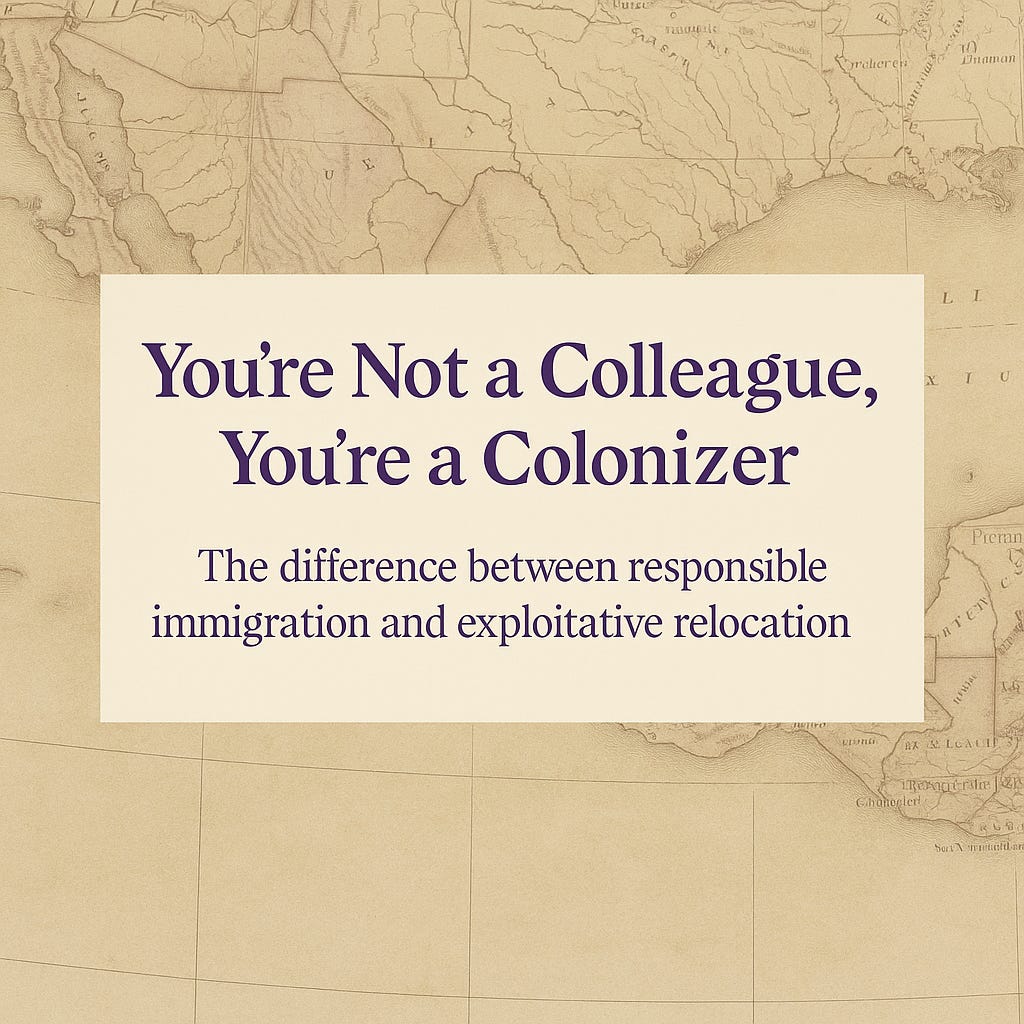You’re Not a Colleague, You’re a Colonizer
The difference between responsible immigration and exploitative relocation
Many people who move to countries like Mexico describe their decision as a form of escape—from capitalism, from the rat race, from political instability, or simply from burnout. They talk about the culture, the affordability, and the warmth of the local people. Often, they claim they are not like other foreigners because they are respectful, low-impact, or more aware.
But choosing to live in the Global South because it is more affordable or peaceful does not automatically place someone outside of systems of empire. In many cases, it places them squarely within it. Moving to another country without understanding or accounting for the ways in which that move is shaped by global inequality is not an act of solidarity. It is an extension of colonial behavior.
The term “expat” is commonly used by people from wealthier nations to describe their life abroad. However, it is not a neutral word. It reflects a double standard: people from the Global North are referred to as expats, while people from the Global South are labeled as immigrants, refugees, or even “illegals,” regardless of their reason for migrating.
This distinction mirrors broader geopolitical dynamics. When someone from the United States or Canada moves to Mexico, their money often goes further. They may earn income remotely in U.S. dollars or euros while spending in pesos. Their presence shifts local economies, drives up housing costs, and often contributes to the displacement of working-class and Indigenous people.
To be in true solidarity with the place you have moved to requires more than enjoying its natural beauty or local cuisine. It involves a deep commitment to learning the language, engaging with history, and building relationships that are not extractive.
Most foreigners living in countries like Mexico do not do this. They consume culture rather than contributing to it. They rely on local labor without advocating for fair wages or improved working conditions. They often live or create “expat enclaves” and participate in economies and housing markets in ways that exclude locals. Their presence is often centered around personal gain rather than collective wellbeing.
Being a responsible immigrant requires humility, legal accountability, and social investment. It means participating in the repair of harm, not replicating the conditions of colonization under a different name.
One of the most common practices among foreigners living in countries like Mexico is the repeated use of tourist visas to stay long-term. Often called “border runs,” this involves leaving the country briefly—just long enough to reset a tourist visa—before returning to continue living and working without any formal immigration status.
While this may seem harmless or clever, it is actually part of a broader pattern of exploitation. It allows individuals from wealthier countries to extract benefits from poorer nations without contributing to their social systems, following their laws, or facing the consequences that local or regional migrants would. These are the very dynamics many of these same foreigners claim to have left behind in places like the United States.
Relying on a tourist visa to live indefinitely in another country means benefiting from local labor, housing, food systems, and public resources without any accountability or reciprocity. It reinforces the same colonial logic that drives displacement and inequality: take what you want, avoid the rules, and assume it’s your right to stay.
This behavior replicates the extractive dynamics of empire. It mirrors how powerful nations exploit poorer ones—demanding open access to land, labor, and resources while policing and criminalizing migration in the opposite direction. People from the Global South who overstay visas or cross borders out of necessity are detained, deported, or vilified. In contrast, people from the Global North are often welcomed, praised for “discovering” beautiful towns, and allowed to bend or ignore the rules entirely.
Ironically, many of the people who engage in this behavior are the same individuals who critique gentrification in cities like Oakland, Brooklyn, or Los Angeles. They speak out against displacement at home while participating in it abroad—moving to places like Oaxaca, Mexico City, or Medellín and contributing to rising rents, cultural erasure, and the exclusion of local communities. The critique stops at the border, but the behavior continues.
These contradictions reveal a deeper issue: the refusal to see oneself as part of the very systems one claims to oppose. The act of relocating to the Global South while living on a tourist visa, working in a foreign currency, and occupying space in historically marginalized communities is not a break from empire—it is its reinforcement, just in a different location. The same forces that push people into homelessness and poverty in the U.S. are at play when foreigners displace local families to claim "cheaper living" elsewhere.
There is no ethical way to critique gentrification while simultaneously enacting it in someone else’s neighborhood.
Living abroad in a responsible way means acknowledging and responding to these dynamics. It means making an effort to integrate rather than isolate. It means refusing to live in neighborhoods where gentrification is pushing out locals. It means paying fair wages, registering with the appropriate authorities, and learning the local language and history.
Responsible immigration also involves resisting the urge to romanticize one’s decision to relocate. Moving abroad is not an inherently radical act. In many cases, it is only possible because of the very systems of inequality that people claim to be escaping.
Accountability begins with recognition. Those who choose to live in other countries must recognize their role in systems of economic and cultural domination. From there, they can begin to move differently.
No one is above the impact of their presence. Until people from the Global North understand that their movements are shaped by the legacy of empire, they are not participating in a global community. They are reproducing the logic of colonization, whether they intend to or not.




